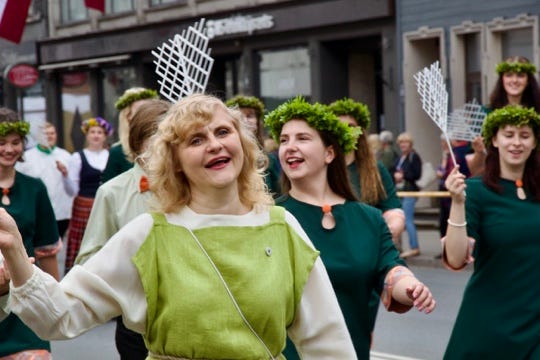Latvia marks 150 years of song festivals that defined it as a nation
Global gathering takes place every five years
With an all-day parade in the Latvian capital on July 2 by more than 40 000 singers, dancers, and other performers, the 27th Latvian Song Festival and 17th Dance Festival started a week of concerts and performances to mark 150 years since the first Latvian “singing festival” in 1873.
Latvia’s outgoing President Egils Levits addressed the start of the parade saying that the first song festival marked the birth of Latvians as a single nation. Like the first song festival, Sunday’s parade “brings “together people of various regions, Kurland (western Latvia), Vidzeme (north central Latvia), Selonia (the south east) and Latgale (the east) .
Marchers in the parade of 1 800 performing groups at the Latvian Song and Dance Festival. Photo: Juris Kaža
Levits also noted that the first song festival saw the first public performance of “God Bless Latvia,” a song by the composer Kārlis Baumanis that later became the national anthem for Latvia as an independent nation.
Under partly cloudy skies, more than 1800 groups of performers marched mainly in regional Latvian folk costumes under the banners of their towns and choirs, dance groups and folk music ensembles. At intervals along the parade route, stands were set up where young men and women in folk costume called out the names of the approaching choirs, bands, and dance groups.
“I think it is really sweet that all Latvia has come together to celebrate this,” a young girl who traveled 160 kilometers to Riga with her mother said. People in the crowd lining Riga’s main street, Brīvības or Freedom Street cheered and applauded the passing groups, sometimes shouting in recognition of friends or family passing by.
Gatis, a young man, said it was the first time he had come to see the opening parade in person. “Usually, I have watched it on television, but here it is a different vibe,” he said.
Andrejs, an Australian of Latvian ancestry, who traveled from Adelaide to the song festival, said he brought his family to “experience the culture,” adding that his daughter was singing in a Latvian choir from the Australian city. Noting that his wife isn’t Latvian, Andrejs said, “My daughter doesn’t speak much Latvian, but she sings.”
Jean, a Canadian from Quebec who has worked in Latvia since 2019 says he sees the song festival as something “unique in the world”. “We don’t have anything like it in Canada, except maybe the (Calgary) Stampede, but that is all cowboys,” he remarked.
Pehr, a German married to a Latvian woman, says that Latvian choir singing has its roots in Germany, but in Germany itself, the tradition has not carried on as it has in Latvia for 150 years. “Things like this (parades of choirs) we have maybe in a few places in the south of Germany,” he said.
Until the 20th century, Latvia was ruled by various foreign powers – some German principalities, Sweden and Russia, but always with a German landowning class. By some historical accounts, the first parade of Latvian choirs in 1873 shocked some Germans who saw Latvians as a peasant people (Bauernvolk) with no higher musical culture.
Historians attribute the spread of choir singing in Latvia to the influence during the 19th century of the German Moravian Church, called by Latvians the Congregations of the Brethren (Brāļu draudzes), known for their emphasis on equality, education, sobriety and singing. During this time, the educated Latvians also began to document tens of thousands of Latvia folk songs and adopt them to choir singing,
Throughout history, Latvian song festivals have adopted to the politics of whoever rule the country. The first festival opened its main choir concert with “God Save the Czar”. After the country declared independence in 1918, “God Bless Latvia” was sung at all festivals until the Soviet Union annexed the Baltic country in 1940. The Nazi occupation administration tolerated the song just after running the Red Army out in 1941, but later discouraged open displays of Latvian national pride.
The first song festival under Soviet rule in 1948 feature tribute songs to Stalin and later to Soviet or Soviet Latvian composers until the national anthem was again sung in 1990, when it was permitted under Soviet leader Mikhail Gorbachev’s perestroika and glasnost (openness). Controversy raged behind the scenes in Soviet times over singing a sanitized version of “Castle of Light” (Gaismas pils) which appeared to be about a mythical sunken castle, but was widely understood to be about Latvia and freedom
In the current song and dance festival’s series of choir concerts, musical and dance performances there will also be tributes to Ukraine in addition to local Ukrainian groups who have always been part of the festival program. Large dance performances will take place in a stadium, the final choir performance at massive, recently renovated outdoor arena and stage
The festival ends with a gala outdoor concert July 9 with almost 16 000 singers on the stage from 454 choirs in Latvia and around the world.




